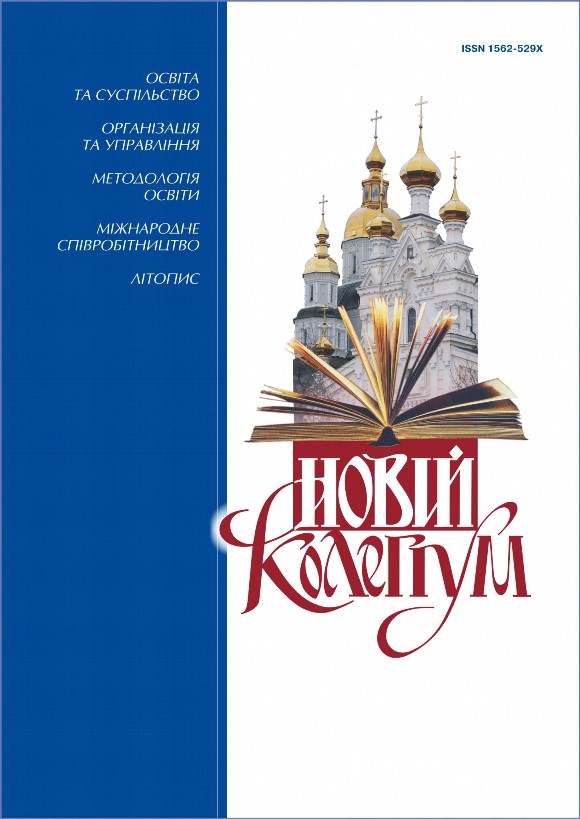Main traits of distance education in high school (on the example of studying the discipline “Physics”)
DOI:
https://doi.org/10.30837/nc.2023.4.88Keywords:
educational process, organization of education, university, distance education, platform of distance education, means of mobile activity, war, study of physicsAbstract
In the conditions of martial law, in which the citizens of Ukraine has found themselves since February 2022, distance education, unfortunately, has become one of the leading forms of the educational process. Distance education is not a new technology. However, it can implement a number of principles of lifelong learning and satisfy the ever-growing demand for knowledge in the information society.
The paper analyzes main traits of the implementation of distance learning in the educational process of a higher education during the period of martial law, using the example of teaching physics. Specific features of the organization of teaching under martial law conditions are defined. Attention is focused on the fact that the organization of the educational process depends on the security situation in each region, access to the INTERNET network and the availability of technical means (computer, mobile devices, etc.). These factors determine the choice of teaching format (synchronous, asynchronous).
Certain electronic platforms, for example, Google-Meet and Google Classroom, became the basis of the organization of teaching process in higher education institutions, in particular in institutions of technical orientation. These platforms provided interaction between the participants of the educational process during the martial law in Ukraine. The exchange of information between teachers and students also takes place by means of the Zoom video conference system and communication through available messengers (WhatsApp, Facebook Messenger, Skype, Viber).
This allows to establish active connection between the participants of the educational process (student – student, student – scientific and pedagogical personnel), which becomes the basis of social aspects of communication and strengthens the motivational basis of the educational process.
Particular attention is focused on the specifics of the working conditions of scientific and pedagogical personnel: teachers must spend more time preparing for classes, adapt teaching methods to the new format (prepare on-line courses, shoot video materials, organize relevant educational and methodological materials, write on-line textbooks).
Attention was drawn to the fact that under modern conditions of the educational process, the relevance of the teacher's functions as the main source of information was gradually lost. All this requires the search for more effective means of learning, which would perform the following functions in the educational process: informing, forming, systematizing, controlling and motivating.
References
Закон України «Про освіту»: редакція від 02.07.2023 року. https://zakon.rada.gov.ua/laws/show/2145-19#Text.
Електронний ресурс // Відомості Верховної Ради України (ВВР). 1996. № 30. С. 141. Режим доступу: http://zakon5.rada.gov.ua/laws.
Освіта України в умовах воєнного стану: інформаційно-аналітичний збірник ; за заг. ред. С.М. Шкарлета. Київ, 2022. 358 с.
Hughes H.G.A. Oxford Dictionary of English (2nd edition) // Reference Reviews. 2004. Т. 18, № 4. С. 36 – 37.
Самойленко О.М. Поняття дистанційної освіти та дискусії навколо неї // Зб. наук. пр. Херсон : Міськдрук, 2011. С. 61.
Технологія створення дистанційного курсу : навч. посіб. / за ред. В.Ю. Бикова та В.М. Кухаренка. Київ : Міленіум, 2008. 324 с.
Осадчий В.В. Система дистанційного навчання університету // Наук. вісник Мелітопол. держ. пед. ун-ту. 2010. № 5. С. 7–16.
Уфімцева О.Ю., Н.М. Шапа Переваги та недоліки дистанційного навчання в сучасних умовах // Освіта в умовах війни: реалії, виклики та шляхи подолання : матеріали ІІ Форуму академічної спільноти. Дніпро : ДВНЗ «ПДАБА», 2022. С. 39 – 40.
Про затвердження Положення про дистанційне навчання : Наказ, Положення від 25.04.2013 № 466 [Електронний ресурс] / МОН України. Режим доступу : http://zakon4.rada.gov.ua/laws/show/z0703-13.
Про деякі питання організації роботи закладів фахової передвищої, вищої освіти на час воєнного стану: Наказ МОН України від 07.03.2022 № 235. URL: https://zakon.rada.gov.ua/rada/show/v0235729-22/sp:max50:nav7:font2#Text.
Даньшева С.О., Череднік Д.Л., Крот Ю.Є. Фізика в будівництві : навч. посіб. Харків : Буран, 2014. 120 с.
Даньшева С.О., Корсунський О.М., Чернець І.В., Полупан О.В. Коливання та хвилі. Атомна фізика. Ядерна фізика : навч.-метод. посіб. з курсу «Фізика». Xарків : ХНУБА, 2016. 72 с.
Фізика в будівництві : навч.-метод. посіб. для проведення лабораторних, практичних робіт та самостійної роботи / С.О. Даньшева, Г.М. Подус, О.В. Полупан. Харків : ХНУБА, 2015. 72с.
Методичні рекомендації щодо організації освітнього процесу з використанням технологій дистанційного навчання під час воєнного стану // https://ippo.edu.te.ua/about/news/uvaga-vazhlivo.

